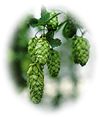|

WHAT
IS A HOP GROWING
AREAS HOP
VARIETIES
The modern hop has been developed from a wild plant as ancient
as history itself. The hop first attracted attention not as an
ingredient in beer but as a medicinal herb in early Egypt. It was later
used in Europe to treat liver disease and general digestive complaints.
622 AD
The first reference to hops in England is a document by the Abbot
Adalhard of Corvey releasing the millers from their duty of grinding
hops and malt. Despite this early reference, hops did not come into
general use in brewing until the end of the 15th Century, at which time
the brewing techniques used in Flanders found their way to Britain.
1450 AD
The presence of hops in beer was accused of stirring up lack Cade, a
Kent man with the alias 'John Mortimer', to launch his ill-fated
rebellion against corruption. Despite his hop inspired victory over
government forces at Sevenoaks and his alias's subsequent pardon from
King Henry Vl, this did not save Cade from being hunted down in I his
own name and mortally wounded by the Sheriff of Kent
1520 AD
The weavers of Flanders settled in Kent to take advantage of that
county's prosperous wool industry and brought with them new varieties of
hops and the knowledge of how to use them effectively in beer. Several
centuries passed between the introduction of hops into England and their
acceptance in standard brewing techniques Traditional Ales such as
Burton Ale, which have been famous since the 13th Century, were still
brewed without hops at the time of Henry VIII. 'Ale' at that time
denoted strong sweet brews of malted barley flavoured with spices, herbs
and bark of trees. The more recent drink of 'beer', which Henry VIII
effectively outlawed by banning the use of hops in brewing, remained in
abeyance until his son, Edward Vl passed special legislation in 1552 to
permit the use of hops again by British brewers.
1574 AD
Reynolde Scott, the 'Father of English hops' wrote the first definitive
work on the English hop industry in which he described every stage in
the cultivation of hops. Unusually for a farmer at that time, he was
educated at Oxford University and had his own hop gardens in which he
tested his observations.
1710 AD
Duty was imposed on hops for the first time and bittering materials
other than hops were excluded. Smuggling of hops became a valuable
pastime.
1774 AD
An Act was passed requiring the 'pockets' in which the hops were packed
to be stencilled with the hop-grower's name, the year and where grown.
At about this time, the famous English Golding hop was developed and
greater emphasis was being placed on individual hop varieties. 1870 AD
The area of hops under cultivation was almost 72,000 acres (29,000
hectares) with a host of new varieties being developed including the
celebrated Fuggle, which was introduced as a commercial variety by Mr
Richard Fuggle in 1875. Hops were grown in 53 counties including eight
in Wales and five in Scotland as far north as Aberdeen.
1932 AD
The Hops Marketing Board was introduced to exercise statutory control
and ensure a sheltered, if unrealistic, market for producers However, in
1982 EEC rules led to the disbanding of the Board and the introduction
of independent Producer Groups for the marketing of English grown hops.
1997 AD
In England, two hundred hop farmers grow hops in a total of 7,526 acres
(3,047 hectares) spread across Hereford, Worcester, Oxfordshire,
Hampshire and the South East. Completion of farm trials of three dwarf
hop varieties for commercial production. Mobile hop picking machinery is
made available to English hop growers.
If you want more information on Beer or Home Brewing try this general
information site: http://www.budweiser-beer.net
or click here
for listed subjects.
If you want to buy hops or learn more about them, why not
contact: Wealden Hops
Limited
Congelows, Benover Road, Yalding, Maidstone, Kent, ME18 6ET
Tel: 01622 817175 Fax: 01622
817014 E-mail:
INFO@WEALDEN-HOPS.CO.UK
WHAT
IS A HOP GROWING
AREAS HOP
VARIETIES
|
